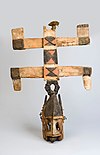
| Part of a series on |
| Traditional African religions |
|---|
 |
A manbo (also written as mambo) is a priestess (as opposed to a oungan, a male priest) in the Haitian Vodou religion.[1][2] Haitian Vodou's conceptions of priesthood stem from the religious traditions of enslaved people from Dahomey, in what is today Benin.[3] For instance, the term manbo derives from the Fon word nanbo ("mother of magic"). Like their West African counterparts, Haitian manbos are female leaders in Vodou temples who perform healing work and guide others during complex rituals.[4] This form of female leadership is prevalent in urban centers such as Port-au-Prince (the capital of Haiti). Typically, there is no hierarchy among manbos and oungans. These priestesses and priests serve as the heads of autonomous religious groups and exert their authority over the devotees or spiritual servants in their hounfo (temples).[1]
Manbos and oungans are called into power via spirit possession or the revelations in a dream.[5] They become qualified after completing several initiation rituals and technical training exercises where they learn the Vodou spirits by their names, attributes, and symbols.[2][5] The first step in initiation is lave tèt (head washing), which is aimed at the spirits housed in an individual's head. The second step is known as kouche (to lie down), which is when the initiate enters a period of seclusion. Typically, the final step is the possession of the ason (sacred rattle), which enables the manbos or oungans to begin their work. One of the main goals of Vodou initiation ceremonies is to strengthen the manbo's konesans (knowledge), which determines priestly power.[2]
The specific skills and knowledge gained by manbos enable them to mediate between the physical and spiritual realms.[2] They use this information to call upon the spirits through song, dance, prayer, offerings, and/or the drawing of vèvès (spiritual symbols).[6] During these rituals, manbos may either be possessed by a loa (also spelled lwa, Vodou spirits) themselves, or may oversee the possession of other devotees.[2] Spirit possession plays an important role in Vodou because it establishes a connection between human beings and the Vodou deities or spirits. Although loas can "mount" whomever they choose, those outside the Vodou priesthood do not have the skills to communicate directly with the spirits or gods. This is because the human body is merely flesh, which the spirits can borrow to reveal themselves via possession.[1] manbos, however, can speak to and hear from the Vodou spirits.[4] As a result, they can interpret the advice or warnings sent by a spirit to specific individuals or communities.[7]
Cécile Fatiman is a Haitian manbo famously known for sacrificing a black pig in the August 1791 Vodou ceremony at Bois Caïman—an act that is said to have ignited the Haitian Revolution.[8] There are also notable manbos within the United States. Marie Laveau (1801-1888), for example, gained fame in New Orleans, Louisiana, for her personal charm and Louisiana Voodoo practices.[9] Renowned as Louisiana's "voodoo queen", Laveau's legacy is kept alive in American popular culture (e.g., the television series American Horror Story: Coven).[10] Mama Lola is another prominent manbo and Vodou spiritual leader in the United States. She rose to fame after the publication of Karen McCarthy Brown's ethnographic account Mama Lola: A Vodou Priestess in Brooklyn. Mama Lola's success provided her with a platform to challenge Western misconceptions of Haitian Vodou and make television appearances.[2][11]
- ^ a b c Métraux, Alfred (2016). Voodoo in Haiti. Pickle Partners Publishing. ISBN 9781787201668. OCLC 969020248.
- ^ a b c d e f Brown, Karen McCarthy (2001). Mama Lola: A Vodou Priestess in Brooklyn. The University Press Group Ltd. ISBN 9780520224759.
- ^ Cite error: The named reference
:14was invoked but never defined (see the help page). - ^ a b Blier, Suzanne Preston (1995). African vodun : art, psychology and power. The University of Chicago Press. ISBN 0226058581. OCLC 717640759.
- ^ a b Kessel, William B. (2011). Lutheran Mission Work Among Haitian Vodouisants. Archived from the original on 2019-06-04. Retrieved 2019-06-04.
- ^ Watkins, Angela Denise (2014). Mambos, priestesses, and goddesses (Thesis). The University of Iowa. doi:10.17077/etd.putbe084.
- ^ Cite error: The named reference
:5was invoked but never defined (see the help page). - ^ Cosentino, Donald J., 1941- (1995). Sacred arts of Haitian vodou. UCLA Fowler Museum of Cultural History. ISBN 0930741463. OCLC 906668425.
{{cite book}}: CS1 maint: multiple names: authors list (link) CS1 maint: numeric names: authors list (link) - ^ Cite error: The named reference
:9was invoked but never defined (see the help page). - ^ D'Angelo, Rafi (January 30, 2014). "Is There Justice for Marie Laveau?". Slate. Retrieved May 11, 2019.
- ^ Cite error: The named reference
:13was invoked but never defined (see the help page).